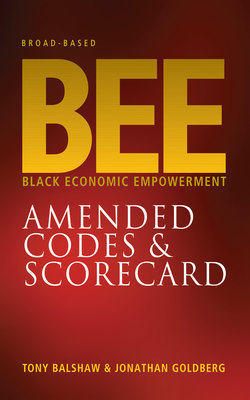Читать книгу Broad-Based BEE - Jonathan Goldberg - Страница 25
На сайте Литреса книга снята с продажи.
CHALLENGING EXISTING PARADIGMS
ОглавлениеRelatively few owners of smaller independent firms have the inclination, the expertise or the resources to grow and pursue strategies that ensure business survival and independent ownership. There is a resistance to change and a reluctance, by family businesses in particular, to be monitored by outsiders. Growth can be amorphous and prospects are often retarded.
Each business will need to examine its raison d’être and choose, commit itself to and position itself in relation to its chosen markets, resources and other strategic options and imperatives. This is a learning process in positioning, reorientating and restructuring on the basis of shared values and committing to the chosen alternative.
Broad-based BEE-driven transitions usually provide owners with the opportunity to challenge existing paradigms in the business. Aspects to consider would include: ownership, leadership, the company itself, values, vision, goals, positioning, culture, performance and succession.
CASE STUDY
Size matters
Small businesses are not little big businesses!
A small-business owner had the following to say:
“. . . BEE probably won’t work within 99 per cent of small businesses. Our business is simply too personal to give a chunk of it away. Now that I think about it – it’s got nothing to do with business. It’s not as if I was an employed MD negotiating to give away a large chunk of some anonymous shareholders’ stock. This is my baby; the product of a pregnancy of years of 8 day weeks of 25 hour days. This isn’t a business; this is my legacy to my children. On top of which it only exists because the bank is financing it by taking ownership of my home, my car, my furniture, my kids’ toys, and the family gerbil’s spawn to the 7th generation. Nobody else could pay me to enslave myself as I do.
“We small-business owners have no option because we are the shareholders as well as management. In fact, we are also the workers! When last did the MD of a big corporate sweep the reception area, make coffee, clean the guest toilet, install the server, rewire the telephone, wash the delivery van or stand in a queue at the bank/post office/Telkom/municipality/ . . . ?”
– Entrepreneurial owner-manager
What works well for a large, widely held public company cannot be assumed to have the same relevance to and positive impact on other businesses. Quantitatively, the widely held company is the exception rather than the norm in South Africa and across the globe.
The turnover threshold of R10 million and below for micro-enterprises to qualify for an automatic exemption is commendable. Nevertheless it may be perceived as being too advantageous to be elevated to a “Level One Contributor” if 100% Black owned (recognition level of 135%) and to a “Level Two Contributor” (recognition level of 125%) if at least 51% Black owned. It is unfortunate that government failed to address the realities of medium-sized businesses. For example, a family owned Spar retailer is likely to have a turnover in excess of the R50 million threshold, but does not have the resources, structures, operational form and capacity to meet the Generic Scorecard criteria and indicators that typically relate to large listed corporates. An annual turnover threshold for QSEs of R200-R300 million would have been more appropriate for medium sized privately-held businesses.
The Codes of Good Practice of 2007 had set ten-year targets effective from February 2007 yet were amended after 7 years; some of the individual Elements were graduated over the ten-year term by setting annual and five-year targets.
It has been noted that large companies, industry charter councils and government representatives involved in formulating the industry-specific transformation charters expect smaller companies to deliver immediately, particularly in relation to narrow-based BEE ownership and management control. The impact of numerous transformation charters and sector codes remains an area of concern, particularly in relation to the impact adverse variations from the Generic Scorecard would have on the economy.
Unfortunately the Amended Codes of Good Practice are unrealistic in a number of aspects as they affect small and medium-sized businesses negatively, especially in relation to ownership
